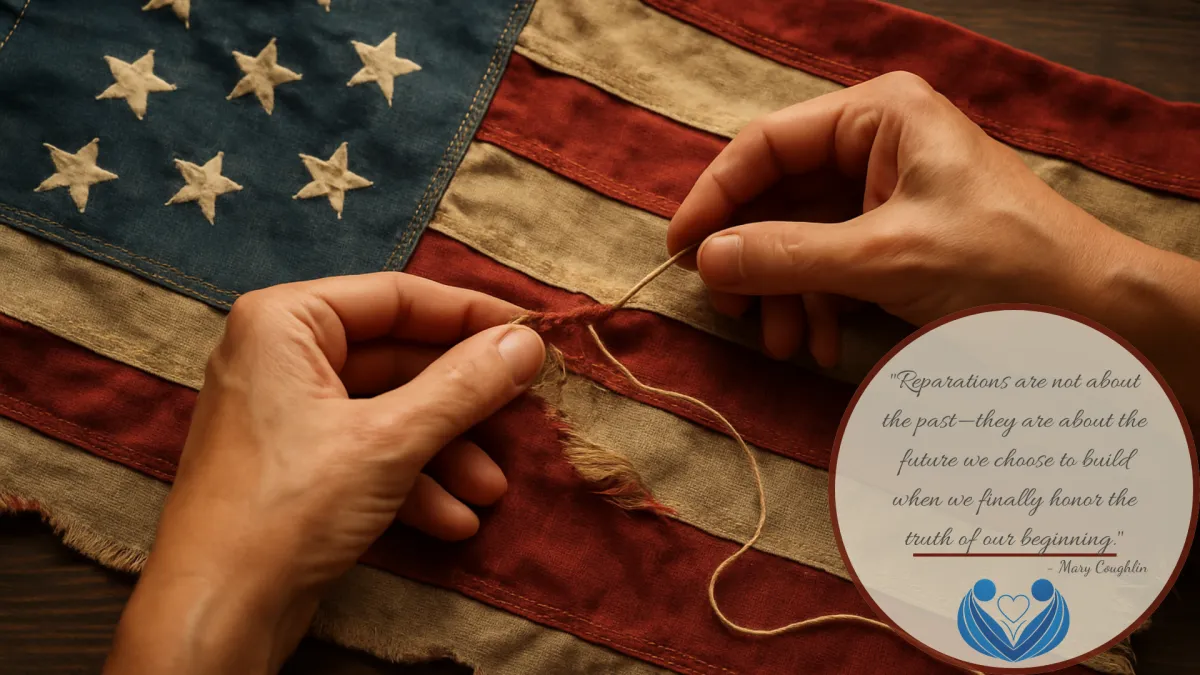
Unfinished Business — Slavery, Reparations, and the Myth of Moving On
"Reparations are not about the past—they are about the future we choose to build when we finally honor the truth of our beginning." — Mary Coughlin
Unfinished Business — Slavery, Reparations, and the Myth of Moving On
We Cannot Heal What We Refuse to Acknowledge
Some wounds don’t close with time.
Especially when no one ever truly acknowledged they were opened.
In the United States, slavery is often treated as a historical footnote—something that happened, ended, and should be politely left in the past. But trauma doesn’t work that way. Not in the body. Not in the nation.
Slavery wasn’t just an economic system. It was a worldview—one that reduced human beings to property and built a society around their exploitation. When the institution was legally abolished, the harm didn’t evaporate. It metastasized—into Jim Crow laws, redlining, mass incarceration, environmental racism, generational poverty, cultural erasure, and psychological wounding.
And we’ve never repaired it.
We Cannot Heal What We Refuse to Acknowledge
In trauma-informed developmental care, we know that rupture without repair leads to dysregulation, disconnection, and distortion of the self. Babies who experience prolonged, unresolved distress don’t “move on”—they adapt, often in ways that cost them connection, safety, and trust.
Our country did the same.
We adapted without accountability.
We taught our children about freedom while hiding the truth about how it was denied.
We declared victory over racism while refusing to name its systems.
We told a story of resilience without ever completing the cycle of repair.
And in doing so, we passed on the unprocessed trauma—not just to Black communities, but to all of us. Because systems built on harm harm everyone, even if not equally.
Reparations as a Developmental Act
What would reparations look like if we treated this like the trauma it is?
It would mean acknowledgment—not just in the abstract, but with specificity.
It would mean compensation—not as charity, but as justice.
It would mean restoration—investing in education, housing, health, and healing.
It would mean relationship—facing hard truths and sitting with the discomfort they bring.
In the NICU, we know that development is not just about survival—it’s about thriving. That requires attunement, support, and ongoing presence. Reparations are no different.
This is unfinished business—not because time forgot, but because we did.
Reflection Prompt
Where in your own life or work have you been tempted to "move on" instead of moving through?
What would repair look like if you let truth—not comfort—lead the way?
Reparations are not about reliving the past—they are about releasing the future.
They are an act of collective maturity. Of moral courage. Of choosing truth over convenience.
And just like in trauma-informed care, repair is never too late—but it is always necessary.
May we be the ones who refuse to look away.
May we be the ones who stitch integrity into the fabric of what comes next.
Weave on, my friend.
—Mary
Coming Next in the Series:
The Other Half: Misogyny, the ERA, and the Legacy of Exclusion
If the wound of slavery fractured the soul of the nation, then the erasure of women created a silence so deep we almost forgot it was there.
In our next reflection, we’ll explore how excluding women from full citizenship—on paper and in practice—continues to shape our institutions, our care systems, and our collective capacity to thrive.
P.S. If this reflection stirred something in you—if you’re feeling the pull to embody this work in deeper, more intentional ways—you may be ready to become a Trauma-Informed Professional.
The TIP 2.0 Certificate Program is more than a course—it’s a journey of healing, leadership, and purpose.
Learn more and join the movement: https://www.caringessentials.net/tip-certificate-program
